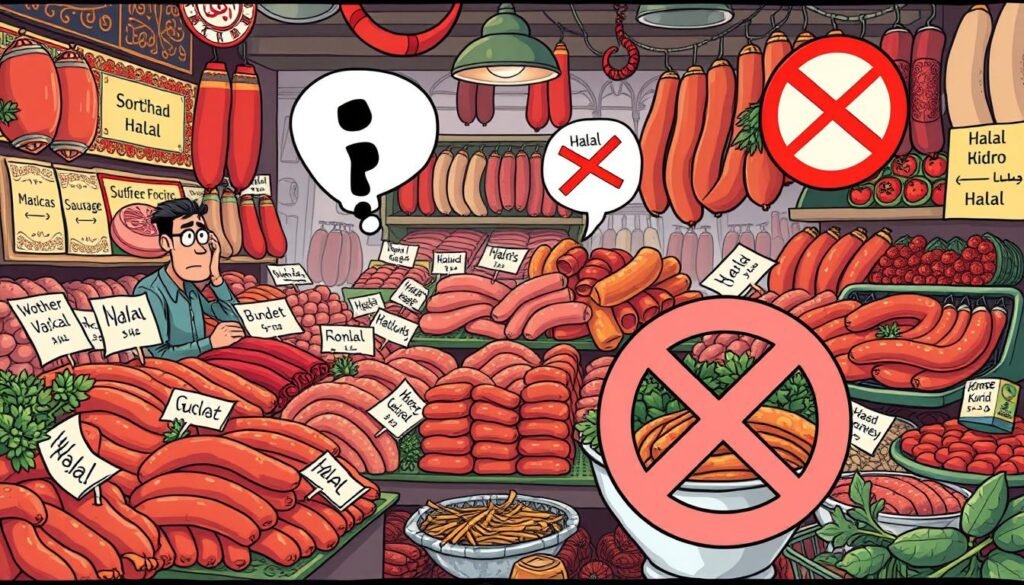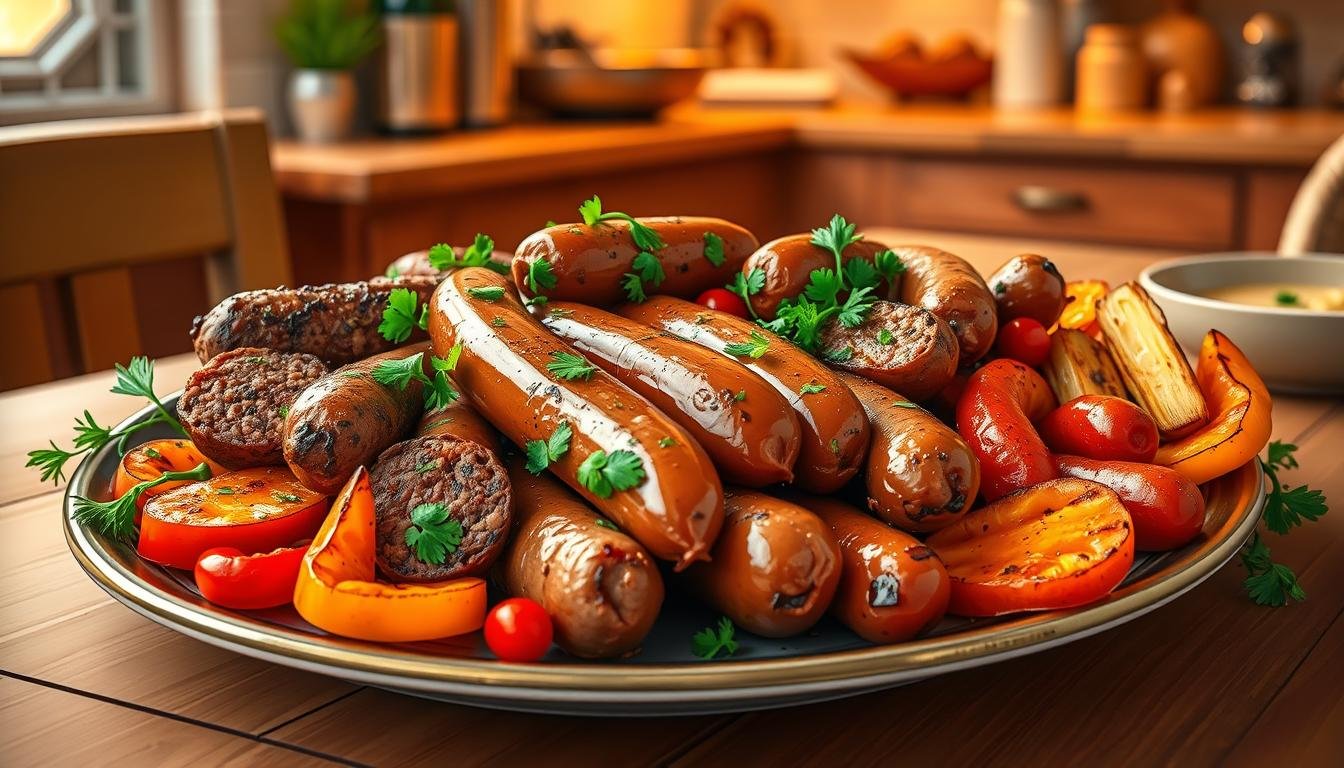Food choices are often shaped by cultural beliefs. For many, sausage is a favorite. But for Muslims, eating sausage raises big questions. It’s about following halal dietary laws in Islam.
We’ll look into what makes halal sausage okay. We’ll also check how ingredients are sourced and certified. With 1.6 billion Muslims worldwide, it’s key to know what they can eat. Let’s explore if Muslims can enjoy sausage while staying true to their traditions.
To learn more about halal requirements in food, check out this informative article. It helps us understand food choices in Islamic culture.
Understanding Halal Dietary Requirements
Halal is key for many Muslims worldwide. It guides their food choices and ethical food practices. Exploring definition of halal shows how faith, health, and community tie together.
Definition of Halal
The definition of halal means what’s okay to eat under Islamic law. It covers food from meat to drinks. Halal foods must not have bad additives and come from animals treated well.
The Zabiha slaughter is a key part of this. It’s a way to kill animals quickly and with care. This method makes meat healthier and more tender.
Importance of Halal in Islam
Halal is more than just food rules in Islam. It’s about community health and faith. Eating halal meat can lead to healthier choices and ethical food sources.
In the U.S., 83% of Muslims eat halal. This shows how important these rules are. Halal food connects people to their culture and offers tasty, healthy options. It brings people together, showing shared values.
What Makes Sausage Halal?
To see if sausage is halal, we check the ingredients and how it’s made. It’s key that the sausage has halal ingredients. These can’t have any banned stuff.
Things like pork, carrion, or alcohol-based additives are no-go’s. Knowing this helps us choose the right sausages.
Ingredients to Consider
Looking for halal sausages means finding ones with the right ingredients. You can find sausages made from chicken, fish, or even plants. With so many types out there, there’s something for everyone.
But, always read the labels. Watch out for things like gelatin or animal-based stuff that might not be halal.
Certification and Packaging
Halal certification is key to knowing a product is up to standard. Groups like ISA do detailed checks to make sure. They look at everything from the meat to how it’s packaged.
Look for the halal logo on the packaging. It shows the sausage is the real deal. Also, check the sausage casings. They can be different, and the certification makes sure they’re okay.
Choosing suppliers who care about quality and ethics makes us trust the sausage more. It’s all about feeling sure about what we eat.
Can Muslims Eat Sausage?
Many Muslims wonder if they can eat sausage. This section will look into what kinds of sausage are okay. It will also talk about important things to think about when picking sausage. It’s key to follow halal dietary laws, as many Muslims want to keep their faith while eating different foods.
Types of Sausage Permitted
There are many meat options that Muslims can eat. Turkey sausage and beef sausage are okay if they come from halal producers. These options let Muslims enjoy sausage without going against their beliefs. Always check the packaging for halal certification to make sure it’s okay.
Key Considerations for Sausage Consumption
When looking at sausage, there are a few things Muslims should think about. Knowing what’s in the sausage is very important. Sausages with bad additives or ingredients should be avoided.
Trust in the producer is also key. Many Muslims like to buy from brands known for following halal rules. Thinking about these points helps keep faith and builds community among those who eat sausage.

Prohibited Ingredients in Sausage
It’s important to know what makes sausage not halal for those who follow Islamic dietary laws. Some ingredients make a product not okay to eat. This knowledge helps people make better choices.
Pork and Carrion
Pork is not allowed in Islam and is considered haram. Carrion, the meat of animals not killed the right way, is also not allowed. Both are not halal and are big concerns for Muslims.
These meats break dietary rules and challenge the halal way of life. Knowing why they are not allowed helps Muslims stick to halal practices.
Prohibited Additives
Food additives add complexity for those looking for halal sausage. Many flavor enhancers and preservatives might have haram stuff. This can make a product seem halal but really isn’t.
It’s key to check labels well, as many processed meats have hidden bad ingredients. Halal certification checks if a product meets Islamic food rules. By avoiding products with these additives, people can keep their diet pure.
The Role of Sausage Casings
Sausage casings are key to knowing if sausages are halal. They come in two types: non-edible synthetic and edible natural casings. Knowing the difference is important for those who follow halal diets. Each type affects if a sausage is okay to eat according to Islamic rules.
Types of Sausage Casings
Natural casings come from animal intestines and are often used. They must be halal certified to meet Islamic standards. Halal sheep casings are very common for sausages and franks.
Synthetic casings, made from collagen, might not always be halal. New options include fish and vegan casings made from plants. These offer more choices for consumers.
Halal Certification for Casings
Getting halal certification for sausages means checking all parts, including casings. It’s important for consumers to look for halal certified casings. This ensures they follow Islamic rules, like no pork.
For Muslims who want to eat sausage, knowing about halal certification is vital. Always check the product details, even from halal-certified places.
Misunderstandings About Halal Sausage
Many people don’t understand what halal sausage is because of a lack of cultural knowledge. They think any sausage labeled “natural” or “organic” is halal. This leads to confusion. It’s important to clear up these misunderstandings because they can impact our food choices and how we interact with different cultures.
Common Misconceptions
Some think any sausage with certain spices or flavors is halal. They ignore important details like the meat’s source and how it’s prepared. They also believe a halal stamp means all ingredients are okay. But, even products labeled as halal might have non-halal ingredients or be contaminated during processing.
Examples of Non-Halal Products
Some sausages have non-halal ingredients like pork extracts or animal by-products. Others might have misleading labels without proper certification. As we look into these misconceptions, I urge readers to learn about halal standards. Knowing what to look for helps us make better food choices and respect cultural differences.

Alternatives to Traditional Sausage
Dietary preferences are changing fast. Now, many options are available for different beliefs and lifestyles. For Muslims, finding halal food is key. Luckily, vegetarian sausage and halal options are easy to find, making cooking fun and safe.
Vegetarian and Plant-Based Options
Vegetarian sausage is popular for its taste and health benefits. It’s made from lentils, chickpeas, and spices. This makes it great for those who don’t eat meat.
Companies like Impossible Foods and Redefine Meat are leading the way. They make sausages that taste like the real thing but don’t have meat. This makes eating out more fun and helps with animal welfare concerns.
Halal Certified Sausage Options
Finding halal sausage can be tricky. It’s important to choose products that clearly say they are halal. For example, Impossible Foods makes a sausage that is halal.
The market is growing to meet Muslim needs. Knowing where food comes from and its certification is key. Plant-based meats must not have alcohol or animal products to be halal.
Importance of Research and Trust in Suppliers
It’s key to know if food is halal before we eat it. Checking if food is halal is very important. With food fraud cases like China’s, where 900 people were jailed for bad meat, we must be careful.
Fraud in food costs billions every year. This can lead to food that’s not halal. For example, some lamb sold in the UK was not really lamb. So, checking food is very important to follow Islamic rules.
Working with trusted halal groups helps us know if food is real. These groups set rules for food to follow halal rules. Labels on food also help us know if it’s halal and where it’s from.
Sausage Consumption Across Different Cultures
Exploring sausage consumption across cultures shows a rich tapestry of traditions. Sausages are more than food; they are part of cultural identity and heritage. In Europe, sausage-making is a celebrated craft.
Each culture brings its own flavors and ways of making sausages. For example, North Africa has spiced merguez, while Germany is famous for bratwurst.
In Muslim communities, sausage consumption is shaped by halal dietary rules. These rules require sausages to be made from allowed ingredients and be certified halal. In the U.S., halal sausages are gaining popularity, appealing to both Muslims and curious non-Muslims.
Looking at sausage globally, we see how cultural attitudes shape what we eat. In some places, pork sausages are common, but in others, like Muslim communities, they are forbidden. This shows how food choices reflect deeper values and beliefs.
By exploring these differences, we can better understand dietary practices worldwide. It helps us bridge cultural gaps and celebrate our diverse food traditions.
FAQ
Can Muslims eat sausage?
What are halal dietary requirements?
What makes sausage halal?
What types of sausage are permissible for Muslims?
What are the prohibited ingredients in sausage?
What is the role of sausage casings?
What are common misconceptions about halal sausage?
Are there alternatives to traditional sausage?
Why is research and trust in suppliers important?
How is sausage consumption viewed across different cultures?

Embracing Faith, One Insight at a Time!
The teachings of the Quran have always guided my path. With a deep passion for Islamic knowledge, I strive to blend the wisdom of tradition with the relevance of today, making the timeless messages of Islam accessible and meaningful for everyone.
Muslim Culture Hub is my platform to share historical insights and thought-provoking articles, exploring both well-known and lesser-discussed aspects of Islamic culture and beliefs. My mission is to create an inclusive online space where everyone can learn, strengthen their faith, and connect with the profound message of Islam.
Join the journey!
May peace be upon you.








